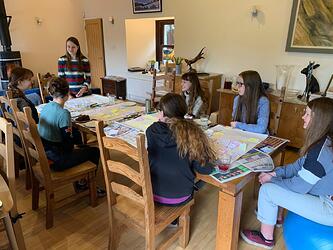Meeting up with other campaigners
When it comes to climate action, it’s important that campaigners team up for exciting adventures. Whether it’s cooking up plans for a community event, diving into a local workshop, or teaming up on school projects, campaigners sometimes decide to meet in person. These meet-ups can boost our power and make our environmental dreams even bigger! But, safety first.
![]() Plan to meet in public places
Plan to meet in public places
Choose busy and public locations, like parks or community spaces, for meet-ups to ensure a secure environment. Never arrange meet-ups at your home or someone else’s residence. Stick to public spaces for everyone’s safety.
![]() Bring a buddy
Bring a buddy
Always have a friend or involve a trusted adult, such as a teacher or parent, when meeting someone from the community.
![]() Share plans with a trusted adult
Share plans with a trusted adult
Inform a responsible adult about your meet-up plans, including the location, time, and the person you’re meeting. Make sure to get permission first and share details.
![]() Verify identities via video
Verify identities via video
Before meeting someone new, ensure they are who they say they are with a video chat. Make sure they are in a well-lit place so you can see them and hear them properly. Remember that image tech is sophisticated these days, so a selfie might not always be real!
![]() Trust your gut
Trust your gut
If something about your meet-up feels weird, speak up! This might include things like last-minute changes in the plan or things that just don’t add up. Stick up for yourself, and don’t feel like you have to be nice to someone that makes you uncomfortable!
![]() Consider age
Consider age
If you are under 18, avoid meeting up with adults without a guardian. Let’s stick to young people changing the world together.
Red flags to look out for ![]()
Last-minute changes in the plan
Weird inconsistencies about their personal life
Refuses to share basic details about themselves
Unwillingness to involve trusted adults or meet in public places
Pressuring you to keep your meet-up or conversation secret
Avoiding video calls or providing recent photos
Talking about deep personal stuff all the time
Behaviour or conversations that make you uncomfortable
Being evasive about their involvement in climate action or community efforts
Reacting negatively to safety concerns or precautions
Telling you that you’re overreacting when asking for basic safety measures
